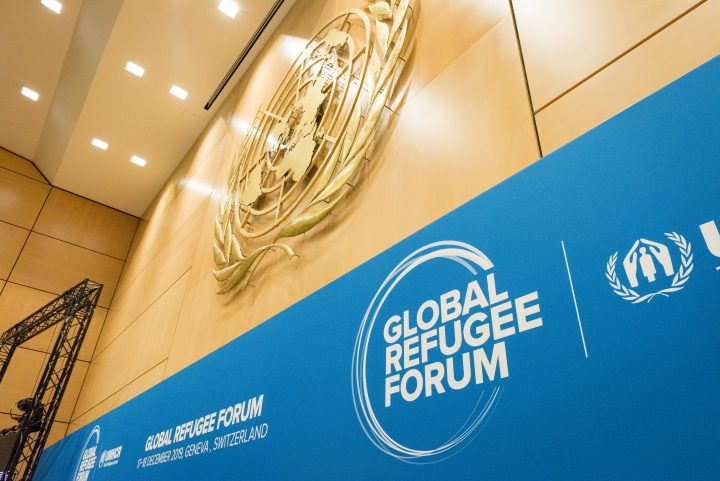The first-ever Global Refugee Forum, guided by the Global Compact on Refugees, wrapped up on 18 December 2019 after 3 days of dynamic, wide-ranging and substantial commitments on how the whole of society can boost opportunities for refugees and their host communities. UNHCR warmly welcomed a series of pledges that were made at the Forum on refugees and digital identity, including from the Government of Estonia, Kiva and ID2020.
The UNHCR Data Service hosted a Speaker’s Corner, together with the Government of Canada on how digital identity can be a pathway to increased opportunities for refugees and enable the realization of the goals of the Global Compact on Refugees.

The ideas introduced came from a series of online and in person consultations on digital identity for refugees undertaken by UNHCR and Immigration, Refugees and Citizenship Canada during 2019 entitled the “Global Virtual Summit on Digital Identity for Refugees”. This resulted in a series of innovative and practical recommendations that are now guiding UNHCR’s work on digital identity and inclusion under its new Data Transformation Strategy 2020-2025.
The project
The Global Compact on Refugees (GCR) emphasizes the importance of registration, identity management and inclusion of refugees in host States’ civil registries, including the key role that digital identification and biometric technologies provided by UNHCR can play. The opportunities that new technologies and innovations can offer to facilitating digital inclusion allowing refugees to contribute more to host communities, such as online education and livelihood opportunities, are also highlighted.
To explore these areas further, UNHCR in partnership with Immigration, Refugees and Citizenship Canada undertook a broad online stakeholder consultation to envision the role that digital identity for refugees can play in enabling the realization of the GCR.
The consultation received 90 submissions received from refugees, researchers, civil society, innovators, entrepreneurs, the private sector and humanitarian and development actors, contributing their experiences, perspectives and expertise on this fast-developing area. Three virtual thematic events allowed the authors of the shortlisted papers to present to a wide online audience. The Summit concluded with a workshop in Ottawa, Canada in June 2019 and a set of conclusions and recommendations were published, alongside other materials, on the project’s website.
The conclusions and recommendations focused on the following areas:
- UNHCR needs to adopt a definition of “digital identity”, which reflects the role that a trusted digital identity plays in facilitating protection and access to services both within and outside the humanitarian ecosystem.
- It is essential that the unique considerations that apply to refugees and their identity be reflected in the legal, regulatory and policy standards that are being developed on digital identity.
- UNHCR should consider establishing principles, standards and practical guidance on digital identity and privacy and data protection for all stakeholders that process refugees’ personal data, reflecting the established principles of refugee protection.
- As States increasingly develop digital identity ecosystems, UNHCR should consider how its digital tools should be developed to work as part of the Host State’s digital ecosystem.
- The further design and development of the digital humanitarian ecosystem should be standards-based and adopt a “people-centred approach”.
- UNHCR should engage with technologists and developers to ensure that refugee protection principles are considered in the development and application of new technologies.
Visit the project’s website to download the full report, view recordings of the virtual events and read some of the submissions received.
These conclusions and recommendations have been guiding UNHCR’s work since and are playing an important role as we craft a strategic and forward leaning action plan on digital identity as a means to improving protection, assistance delivery and solutions for refugees under our new Data Transformation Strategy 2020-2025.
